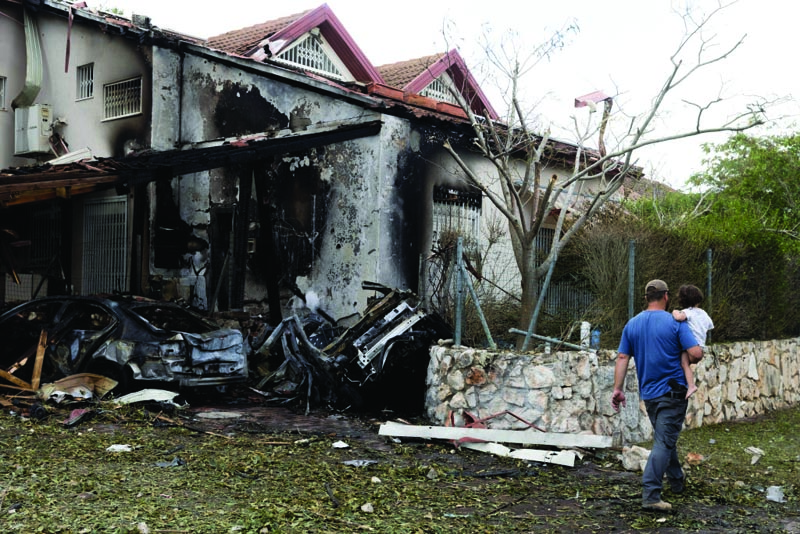 An Israeli army vehicle moves in Northern Israel near the border with Lebanon on September 12, 2024 in Northern Israel (Photo by Amir Levy/Getty Images)
An Israeli army vehicle moves in Northern Israel near the border with Lebanon on September 12, 2024 in Northern Israel (Photo by Amir Levy/Getty Images) Now there’s another war.
More accurately, there’s a new front in a war that’s already been raging for some time. And more precisely than that, this is simply an escalation of a war that has been ongoing for 76 years now, and for several millennia before that.
But regardless of the semantics, Israel is now engaged in a major military conflict in Lebanon for the first time since 2006. To be clear, it is simply one more battle in the multi-front offensive that Iranian agents have waged against the Jewish state since its founding. But on the heels of the ongoing conflict against Hamas in Gaza, this latest flareup has the potential to have a greater impact on Israel, Iran and the broader Middle East than any of its precursors. By the time this fight is over, the region could look much different than it does today.
Since the Hamas terrorist attacks last October, Israel has endured Hezbollah’s ongoing missile barrage into the northern part of the country, responding with similarly intermittent air strikes but avoiding a more aggressive response which could lead to broader violence. (The Western media refers to these encounters as “tit-for-tat” skirmishes. But we’ve learned that it’s much easier to condescend from a safe distance.)
After several weeks of signaling that their patience was running out, Israel has now taken its response to an entirely different level. As a ceasefire in Gaza continues to look less and less likely, Israel’s leaders have decided that the best way to win a second war is to prevent it from happening. Still smarting from the unexpected terrorist assault of Oct. 7, the Israeli military and intelligence services have gone on offense against their foes to the north, with a series of dramatic attacks specifically designed to warn Hezbollah away from further provocations.
First came a pair of technology-based strikes that seemed designed as a way of taunting the Lebanon-based terrorists. By implanting explosive devices in old-school pagers and walkie-talkies that had been distributed to avoid smartphone detections, Israeli operatives delivered a demoralizing message to Hezbollah’s leaders as to their technological and military superiority. Days later, IDF aircraft launched a more traditional incursion with a raid that killed many of the terrorist organization’s most senior remaining leaders, followed by a much wider and more damaging aerial assault.
Hezbollah has long been considered to be a much more powerful threat to Israel than Hamas, and conventional wisdom assumed that Israel would be more reluctant to commit to a larger military confrontation. But last week’s attacks seemed designed to dispel those assumptions, and to preemptively convince Hezbollah’s remaining commanders that a broader war would end very badly for them. At the time this was written, the full scope of the terrorists’ response was not yet known. But it would be surprising if either Iran’s mullahs or their agents in Lebanon were still nearly as optimistic about what a full-scale war could bring.
For decades, Iran has relied on its clients throughout the Middle East to antagonize Israel on their behalf. Hamas’ relative success may have bolstered their confidence of Iran’s ability to fight and win a war by remote control. The ceaseless attacks – from Gaza, from Lebanon, from Yemen and from the West Bank – will not stop. But Israel’s recent actions to weaken and embarrass Hezbollah is likely to force a reconsideration of the mullahs’ strategy.
By going on the offensive in Lebanon, Israel may also be sending a helpful message to Saudi Arabia, Jordan and other regional players whose longtime fear of Iran has led them into a closer relationship with Israel.
By going on the offensive, Israel may also be sending a helpful message to Saudi Arabia, Jordan and other regional players whose longtime fear of Iran has led them into a closer relationship with Israel. The tragedy of Oct. 7 made them wonder if Israel was as valuable an ally as they had previously believed, so the price of stronger ties to the Jewish state had become more costly. They have now been reminded why this partnership is in their best interest. The renewed and expanded Abraham Accords look much more achievable now than they did before Hezbollah’s pagers began exploding.
Peace is still a long way off. But stability might actually be closer.
Dan Schnur is the U.S. Politics Editor for the Jewish Journal. He teaches courses in politics, communications, and leadership at UC Berkeley, USC and Pepperdine. He hosts the monthly webinar “The Dan Schnur Political Report” for the Los Angeles World Affairs Council & Town Hall. Follow Dan’s work at www.danschnurpolitics.com.






















 More news and opinions than at a Shabbat dinner, right in your inbox.
More news and opinions than at a Shabbat dinner, right in your inbox.